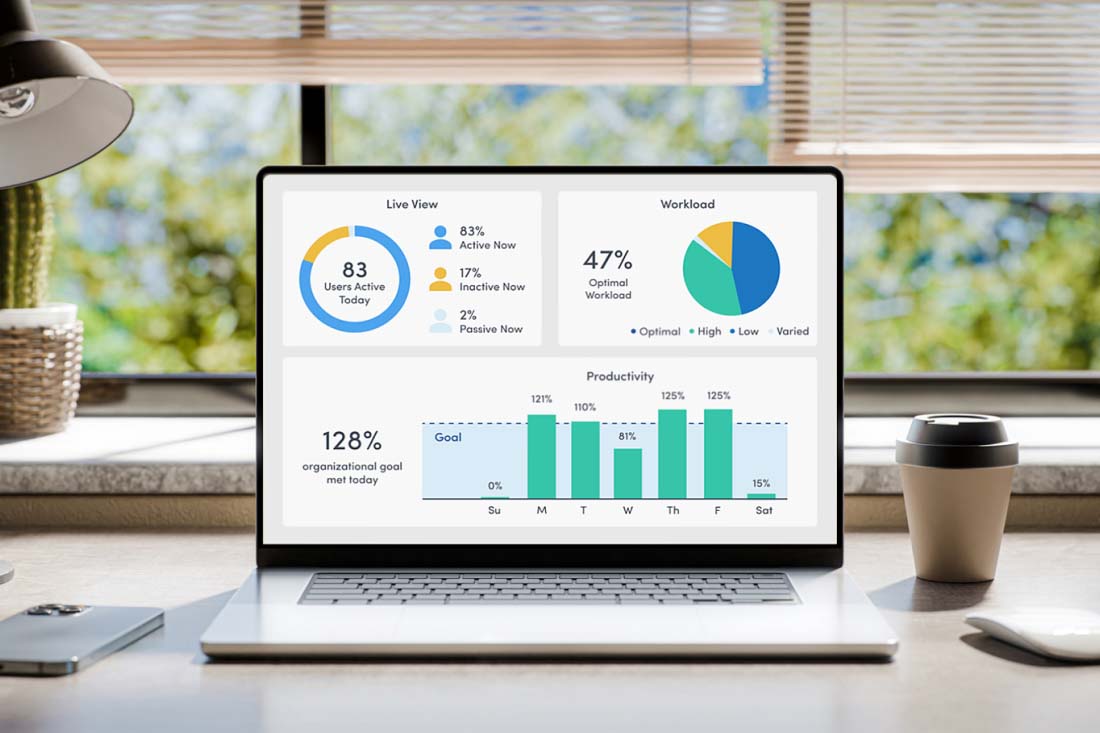Part 4 of a 4-part blog series
Read Part 1: The Employee Perspective
Read Part 2: The Manager Perspective
Read Part 3: The HR Perspective
Trust is a non-negotiable element that brings together data capture and analysis, quality, reliability, respect for privacy, compliance, company culture and transparency, and more. Furthermore, the value of data increases exponentially when it is combined and used in context and allows people, processes and technology to work in unison to achieve mutually beneficial outcomes.
Our rapid shift to a work-from-anywhere world has left no group untouched. Routine leadership activities overseeing business operations and decision-making now present an additional layer of complexity in navigating timely information sharing over a largely distributed workforce.
As the transition to remote-hybrid scenarios becomes permanent, leaders expressed to us the need for access to a solution that helps sustain productive and healthy teams, regardless of when and where work gets done. According to an IBM report, accelerated digital transformation and employee-centric initiatives to engage and enable the workforce are critical to gain a competitive advantage to survive and flourish in this new world. And our very own ActivTrak 2022 State of the Workplace Report uncovers opportunities to make investments in employee experience to support the general well-being of employees in and outside the workplace.
Workforce analytics technologies present the data-driven solution to understand how work gets done in this new (virtual) normal across all levels in the organization, by measuring leading performance indicators across people, processes and technology. The resulting insights delivered in real-time enable executives with proactive, informed decision-making tools to successfully lead their organizations.
Let’s look at some of the ways that executives can share workforce analytics data to help the organization while strengthening their trust and transparency with employees.
Set the Tone as Champions of Trust & Transparency
Progressive organizations that are open and transparent with their employees on the intent, purpose and objectives of workforce analytics see increased levels of trust and adoption. An employee-first, privacy-conscious approach to onboarding the organization ensures employees’ privacy is respected and protected and strengthens trust in the leadership. When leaders set the right example and use a workforce analytics solution for themselves, it inspires accountability and fuels a company-wide, data-informed culture.
As leaders, it is important to formulate data privacy strategies that are supportive to the employee and aligned with the core values of the organization. Most larger organizations are focused on preserving customers’ and employees’ privacy protections. Choose technologies that enable customizing and configuring privacy settings to best fit the unique needs of your organization, industry and customers. A top-down approach in understanding how we work as individuals and as a team adds tremendous value in optimizing internal resources and productivity outcomes.
Build an Employee-Focused Culture Centered on Sustainable Productivity
Often, employee disengagement and burnout build gradually over time at individual and team levels. Without early and targeted intervention, it can manifest visibly through organizational productivity decreases, employee turnover and financial costs. Data from Workforce Analytics platforms can spotlight these hard-to-measure insights about people and processes such as if an employee or team is consistently overutilized and approaching burnout.
An employee-focused privacy-centric approach to Workforce Analytics delivers early indicators and the right contextual level of insights to root cause and enable frontline managers and leadership teams to be proactive to their employee needs, without infringing on their sense of privacy. Employees who believe their data is protected and secure are more open to adopting the benefits of analytics in improving their individual work patterns towards healthier, sustainable productivity levels.
Create Improved Engagement and Richer Employee Experiences
The biggest benefit of Workforce Analytics is the ability to collect, distill and aggregate data from the everyday unique work behaviors of individual employees into broader indicative trends of productivity. Much like anonymous employee surveys, platforms with appropriate data privacy guardrails in place can allay concerns of privacy and instead, bring focus on the incredible value of data in improving work-life quality.
Continued monitoring of these indicators at the organizational level helps leaders get ahead of any worrying trends early and initiate appropriate adjustments and course correction. Whether recognizing any skills gap, evaluating flexible schedules and location policies, or identifying early signs of burnout, the right workforce analytics platform gives you the tools to make ongoing adjustments to your people management strategies for better business outcomes, improved productivity and happier employees.
Giving employees access to their own work data for self-awareness and improvement can spark healthy and supportive conversations with their teams and managers on balanced workloads, flexibility needs and general well-being. Workforce analytics solutions can prove to be an influential compass to advance performance across all data points to improve the overall employee experience.
Advocate Fair and Balanced Career Decisions, Inclusive Workplace Policies
There are many subjective and unconscious biases at play in a traditional workplace environment. For example, ‘proximity bias’ is the notion that on-site employees are more productive than off-site remote employees. Or that the most vocal employees in meetings are perceived to be most knowledgeable and better suited for managerial positions. One of the biggest fears with Workplace Analytics is that the collected data applied without appropriate context could impact an individual’s performance and career progression decisions.
Savvy business leaders realize that modern Workforce Analytics solutions address all these concerns with a data-driven approach that is privacy-protected, objective, and quantifiable. Trends into work patterns and behaviors linked to business outcomes, provide a level playing field to all employees irrespective of their gender, age, personality (introvert, for example) or location. Robust privacy controls ensure that the individual data is kept confidential within the organization and limited to role-based access and permissions.
Employees with access to their own data are empowered to take ownership of their individual work productivity, and proactively seek support and resources where they need help. Data-informed insights help executives steer the organization towards an equitable, inclusive culture and build employee trust by elevating the status of data as an integral component of company decision-making. The rewards of a culture of empowerment are reflected in retaining your top employees and becoming an attractive destination for new talent.
A Workforce Analytics Solution Designed for Everyone
A Workforce Analytics solution provides data-driven insights to enable better decision-making and a healthier workforce, all in a privacy-conscious environment that is right for your organization. This journey starts at the top, and executives have the opportunity to be the company champions for using Workforce Analytics to improve employee trust, productivity and satisfaction.
About ActivTrak
ActivTrak’s workforce analytics provide predictive insights that help leaders, managers, and employees build trust, deepen engagement and boost productivity in the modern, hybrid workplace. This work is supported by the ActivTrak Productivity Lab, a global center for ground-breaking research and expertise that leverages data sourced from more than 9,500 customers and over 550,000 users. Based in Austin, Texas, ActivTrak is backed by Sapphire Ventures and Elsewhere Partners and is led by a seasoned team of software industry veterans. To learn more visit: https://www.activtrak.com/.





